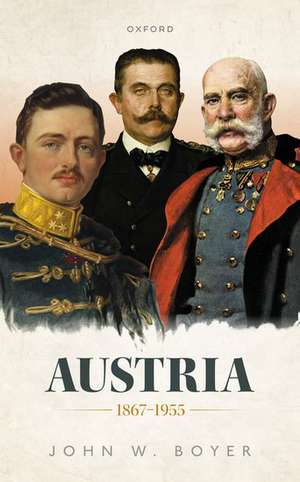Austria 1867-1955: Oxford History of Modern Europe
Autor John W. Boyeren Limba Engleză Hardback – 13 oct 2022
Din seria Oxford History of Modern Europe
- 10%
 Preț: 243.26 lei
Preț: 243.26 lei - 10%
 Preț: 254.95 lei
Preț: 254.95 lei - 6%
 Preț: 163.11 lei
Preț: 163.11 lei - 17%
 Preț: 346.83 lei
Preț: 346.83 lei - 27%
 Preț: 425.00 lei
Preț: 425.00 lei - 34%
 Preț: 663.36 lei
Preț: 663.36 lei - 34%
 Preț: 1469.61 lei
Preț: 1469.61 lei - 33%
 Preț: 533.25 lei
Preț: 533.25 lei - 33%
 Preț: 599.00 lei
Preț: 599.00 lei - 13%
 Preț: 325.50 lei
Preț: 325.50 lei - 7%
 Preț: 347.51 lei
Preț: 347.51 lei - 34%
 Preț: 885.41 lei
Preț: 885.41 lei - 33%
 Preț: 541.04 lei
Preț: 541.04 lei - 34%
 Preț: 1530.84 lei
Preț: 1530.84 lei - 34%
 Preț: 999.12 lei
Preț: 999.12 lei - 30%
 Preț: 364.50 lei
Preț: 364.50 lei
Preț: 301.51 lei
Preț vechi: 321.62 lei
-6% Nou
Puncte Express: 452
Preț estimativ în valută:
57.69€ • 60.40$ • 47.74£
57.69€ • 60.40$ • 47.74£
Carte disponibilă
Livrare economică 04-10 martie
Livrare express 04-08 martie pentru 89.92 lei
Preluare comenzi: 021 569.72.76
Specificații
ISBN-13: 9780198221296
ISBN-10: 0198221290
Pagini: 1152
Dimensiuni: 160 x 242 x 50 mm
Greutate: 1.42 kg
Editura: OUP OXFORD
Colecția OUP Oxford
Seria Oxford History of Modern Europe
Locul publicării:Oxford, United Kingdom
ISBN-10: 0198221290
Pagini: 1152
Dimensiuni: 160 x 242 x 50 mm
Greutate: 1.42 kg
Editura: OUP OXFORD
Colecția OUP Oxford
Seria Oxford History of Modern Europe
Locul publicării:Oxford, United Kingdom
Recenzii
In his brilliant opus magnum John Boyer shows why Austria needed three attempts to build a stable democracy and how co-operation of formerly antagonistic political elites finally succeeded in the years after World War II.
This volume offers a very comprehensive analysis of Austrian history. The extensive bibliography and index add to its usefulness for scholars. Given the in-depth coverage, the text will be most useful to those who are already familiar with the basics of Austrian history.
This volume offers a very comprehensive analysis of Austrian history. The extensive bibliography and index add to its usefulness for scholars. Given the in-depth coverage, the text will be most useful to those who are already familiar with the basics of Austrian history.
Notă biografică
John W. Boyer is the Martin A. Ryerson Distinguished Service Professor in History at the University of Chicago and an Editor of the Journal of Modern History. A specialist in Central European history, Boyer has written three books in the field of Austrian political and social history, most recently Karl Lueger (1844-1910): Christlichsoziale Politik als Beruf, published in 2010. In 2015 he published The University of Chicago. A History. Boyer has received the Cross of Honor for Science and Art, First Class, from the Republic of Austria, in recognition of his scholarly work on the Habsburg Empire. He is also a Corresponding Member of the Austrian Academy of Sciences. Since 1992 he has served as Dean of the College at the University of Chicago.
